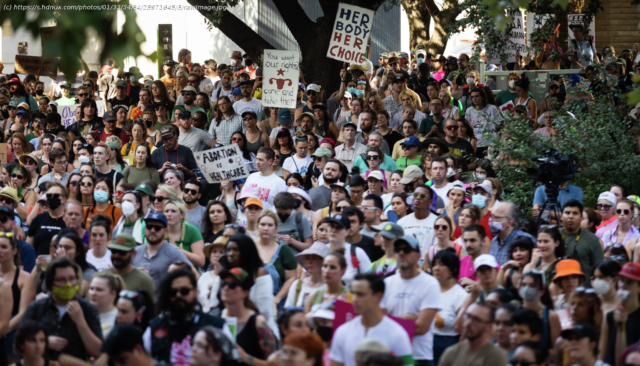The impact of Texas’ near-total ban on abortion is coming into focus for both patients and providers — some of whom have chosen to leave the state.
Protesters march from the federal courthouse to the state Capitol in Austin in opposition to the U.S. Supreme Court’s decision to overturn Roe v. Wade on June 24, 2022.
When the U.S. Supreme Court overturned Roe v. Wade, many in Texas, the largest state in the nation to ban nearly all abortions, began to cycle through the stages of grief.
There was denial and anger, as thousands poured into the streets, promising to never stop fighting to turn back the clock and restore abortion access. There was bargaining, in the form of a last-ditch lawsuit to keep clinics open a few weeks longer, and depression, when it failed to change the new legal norm.
Now, a year after the Dobbs v. Jackson decision, an uneasy acceptance has settled over Texas, as even the most ardent abortion advocates acknowledge these new laws aren’t changing anytime soon.
“I don’t see the legal landscape of our state shifting in a major way, certainly not in the short-term future,” said Neesha Davé, executive director for the Lilith Fund for Reproductive Equity, an Austin-based abortion fund. “And so, unfortunately, we have had to figure out how to navigate the current legal landscape, if for no other reason than there are people who need abortion care today, yesterday, tomorrow.”
There are ongoing court challenges to Texas’ laws, but they are narrow and could drag through the courts for years. There is still momentum around meaningful political change, but that is the work of decades and much of the focus has shifted to shoring up the social safety net as a stop-gap measure.
Meanwhile, despite exceptions to the law, the number of monthly abortions in Texas has dropped into the low single digits. Women are nearly dying from pregnancy complications, or actually dying after having to travel out-of-state for abortions, or facing million-dollar lawsuits for helping friends acquire abortion medication. An unknown number are having babies they never planned for.
A year after the U.S. Supreme Court ruled in Dobbs v. Jackson that there is no constitutional right to abortion, some long-time advocates see hope in the hopelessness. They’ve been sounding the alarm about the overturn of Roe and its consequences for years, and finally, people are forced to pay attention.
“There are so many more conversations happening about abortion today than there were two years ago,” Davé said. “I do think a tide is turning. It just takes time.”
Dr. Alan Braid first started performing abortions in Texas shortly after Roe v. Wade was decided in 1973. Over the last 50 years, he built two clinics, raised a family and merged the two after his daughter, Andrea Gallegos, came in to help run Alamo Women’s Reproductive Services in San Antonio and Tulsa.
Together, this multigenerational Texas family business weathered protesters and lawsuits and ever-increasing restrictions from the Legislature. But on June 24, 2022, that all came to an end.
Immediately, the clinic stopped performing abortions. A few weeks later, they closed their doors for good. And one year later, Braid has moved to Albuquerque, New Mexico, and Gallegos is preparing to move her family to Carbondale, Illinois, each to run one of the two new Alamo clinics.
“This is my home state, and I feel like I’m abandoning it, in some sense,” Gallegos recently told The Texas Tribune. “But on the other hand, all we can do right now is to provide a viable option, even if it still feels crazy to say that a clinic that is 10, 13 hours away is a viable option.”
The New Mexico clinic primarily sees people driving and flying in from Texas, while the Carbondale clinic mostly gets people driving from Indiana, Missouri, Kentucky and other southern states, Gallegos said. But even there, 10 hours from Dallas and two hours from the nearest airport, they see some Texans.
“People are making journeys that long to get to us, and they’re incredibly grateful for it,” Gallegos said. “But, of course, I will always be most concerned about the folks that cannot travel and … the many more patients we don’t see.”
People who have abortions tend to be low-income and already have at least one child, national statistics show. Many of their patients struggled to find time off of work, child care and transportation to make it to a local clinic, Gallegos said, let alone a multiday, out-of-state journey.
As abortion restrictions have tightened over the last few decades, grassroots abortion funds have popped up across the state, helping Texans pay for the procedure and related costs. When Texas banned nearly all abortions after about six weeks of pregnancy in September 2021, these funds became the main infrastructure helping Texans to seek abortions in nearby states.
But immediately after the ruling came down in late June, many of these groups stopped distributing funds, citing the legal uncertainty about their work.
A group of these funds ultimately filed a federal lawsuit, asking a judge to clarify whether their work in-state that helped people travel out of state could make them vulnerable to prosecution.
“Because we’d faced threats of criminalization from anti-abortion state leaders, we knew we couldn’t resume our key work, this core part of our mission, with this uncertainty,” Davé said.
Start
United States
USA — mix A year after Dobbs decision, Texas has settled in to a post-abortion...






